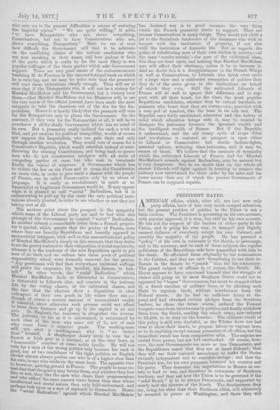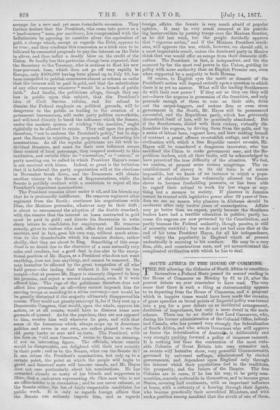PRESIDENT HAYES.
AMERICAN affairs, which, after all, are just now only party affairs, have of late very much escaped attention, but the present position of politics in the Union is not a little curious, The President is governing on his own account, with popular approval, it is true' but still on his own account. He has not the support of the leaders of either party in the Union, and is going his own way, in tranquil and slightly amused defiance of everybody except his own Cabinet, and possibly the majority of the people. He has pursued a "policy" of his own in reference to the South, to patronage, and to the currency, and on each of these subjects the regular politicians of the Republican side have quarrelled with him to the death. He affronted them originally by his nominations to the Cabinet, and they are now threatening to use their in- fluence in the Senate to " punish " him for his contumacy. The grand subject of offence is, of course, the South. Mr. Hayes appears to have convinced himself that the struggle of classes still going on in most Southern States could not be appeased by " bogus " Governments, but must be stopped either by a direct exertion of military force, or by allowing each State to regulate itself, without interference from the Federal power. As he had no sufficient Army at dis- posal and had obtained certain pledges from the Southern leaders, he chose the latter course, ordered the Federal troops to cease from interference in politics, and finally withdrew them from the South, sending the whole army, now reduced to 25,000, to do duty on the frontier. The ultimate result of this policy is still very doubtful, as the Whites have not had time to show their hands, to propose labour or vagrant laws, or to do anything except resume possession of all offices, but the immediate result has been comparative calm. The negroes are ousted from power, but are left unattached. Of course, how- ever, the new Governments are more or less Democratic, and the Republicans assert that they are at heart disloyal; that they will use their restored ascendancy to make the States virtually independent and to establish serfage ; and that the President has, for his own purposes, betrayed his country and his party. They denounce his negotiations in Mexico as cer- tain to lead to war, and therefore to extensions of Southern territory, and they ask how the Union is to be governed if the "solid South" is to be always Democratic, and supported by nearly half the electors of the North. The Southerners, they say, being far abler than their Northern allies, will ultimately be reseated in power at Washington, and there they will
arrange for a new and yet more formidable secession. They further declare that the President, who came into power as a " hard-money" man, par excellence, has compromised with the Inflationists by agreeing to consider silver the equivalent of gold, a charge which, except as regards the Debt, appears to be true ; and they condemn this concession as a trick sure to be followed by successful proposals to pay the interest on the Debt in silver, and thus inflict a deadly blow on the credit of the Union. So loudly has this particular charge been repeated, that the Secretary to the Treasury, who is anxious to float his new four-per-cent. loan, which does not go off very rapidly in Europe, only 1400,000 having been placed up to July 10, has been compelled to publish assurances almost as solemn as oaths that the interest will be paid in gold, and that the substitution of any other currency whatever "would be a breach of public faith." And finally, the politicians allege, though they say less in public upon this subject, that the President's idea of Civil Service reform, and his refusal to dismiss the Federal employs on political grounds, will be dangerous to the public as leading to the creation of a permanent bureaucracy, will make party politics unworkable, and will tend directly to break the influence which the Senate, under the modern system of working "the machine," ought rightfully to be allowed to retain. They call upon the people, therefore, "not to endorse the President's policy," but to sup- port the Senate in rejecting his proposals and thwarting his nominations. As all the regular politicians are lie's with in- dividual Senators, and must for their own inflaence secure their control of local patronage, they respond zealously to this invitation, and outside Ohio no "convention," or "caucus," or party meeting can be called in which President Hayes's name is not received with hisses. Indeed, so great is the irritation that it is believed the party organisation will at the elections in November break down, and the Democrats will obtain another victory in the House of Representatives, while the Senate is publicly credited. with a resolution to reject all the President's important nominations.
The President remains silent under it all, and his friends say that he is profoundly indifferent. He removes regiment after regiment from the South ; continuos his negotiations with Diaz, the Mexican pretender, whatever may be their drift ; is about to recommend the adoption of the double standard, with the reserve that the interest on loans contracted in gold must be paid in gold ; and directs his Secretaries to write sharp letters to candidates for employment. He removes nobody, gives to visitors who seek office dry and business-like answers, and in fact, goes his own way, without much atten- tion to the thunderbolts which his enemies declare, rather shrilly, that they are about to fling. Something of this sang- &aid is no doubt due to the character of a man naturally very calm and resolute, but a good deal is due also to the excep- tional position of Mr. Hayes, as a President.who does not want anything, does not fear anything, and cannot be removed. He may hereafter be affected by the great temptation of all who hold power—the feeling that without it life would be too insipid—but at present Mr. Hayes is sincerely disposed to keep his promise, and reject a second nomination, even if it were offered him. The rage of the politicians therefore does not affect him personally at all—they cannot impeach him for moving troops or acceding to a silver currency—nor would he be greatly disturbed if the majority ultimately disapproved his course. They could not greatly interrupt it, for if they sent up a Democratic Congress, that would, upon the whole, approve his action, or at all events, would have to discover some new grounds of quarrel. As for the populace, they are not opposed to him, receive him well wherever he goes, and with that sense of the humorous which always crops up in American politics and never in our own, are rather pleased to sue the old party hacks so sore and so irate. The President, with his, foot.on "old man Cameron," seems to them an amusing,
if not an interesting figure. The officials, whose enmity would be disagreeable, are delighted with their new security in their ports; and as to the Senate, what can the Senate do ? It can refuse the President's nominations, but only up to a certain point, the point at which the people will begin to growl and Senators' seats will become unsafe, and Mr. Hayes does not care particularly about his nominations. He has
rewarded already so many of his friends and supporters in Ohio, that a caricature representing the Ohio man who is not
an office-holder is in circulation ; and he can never exhaust, or the Senate either, the list of fairly respectable candidates for public work. It is only as regards foreign affairs that the Senate can seriously impede him, and as regards foreign affairs the Senate is very much afraid of popular opinion. It may be very much annoyed at his punish- ing border-raiders by passing troops over the Mexican frontier, as he did last week, but the people decidedly approve that "vigorous action," and if the Mexican President retali- ates, will approve the war, which, however, we should add, is a most improbable result, unless the dominant party in Mexico think that war would offer an escape from their domestic diffi- culties. The President, in fact, is independent, and for the moment by far the most real power in the Union, guiding its policy with more authority than an English Premier can, even when supported by a majority in both Houses.
Of course, to English eyes the merit or demerit of the President's action will depend entirely upon a question to which there is as yet no answer. What will the leading Southerners do with their new power ? If they act as they say they will act—leave the negroes in possession of the franchise, and only persuade enough of them to vote on their side, drive out the carpet-baggers, and restore firm or even stern government in the South, Mr. Hayes will be pronounced successful, and the Republican party, which has grievously discredited itself of late, will be practically abandoned. But if the Southerners, elated with their victory, virtually dis- franchise the negroes, by driving them from the polls, and by a series of labour laws, vagrant laws, and laws making breach of contract a penal offence re-establish serfage, and with it a civilisation with which a free Republic cannot co-exist, Mr. Hayes will be considered a dangerous innovator, who has sacrificed the Union to make government easy, and the Re- publican leaders, with all their faults, will be acknowledged to have perceived the true difficulty of the situation. We feel, we confess, at present some serious misgivings. The re- establishment of slavery in its old form is of course impossible, but we know of no instance in which a popu- lation of slaveholders has voluntarily allowed its former slaves to become freeholding peasants, or has been able to regard their refusal to work for low wages as any- thing but a menace to society. If planters in Jamaica cannot be trusted with legislative power after 39 years of free- dom we see no reason why planters in Alabama should be moderate after only twelve years of emancipation. Affairs may go better than we expect, partly because the Southern leaders have had a terrible education in politics, partly be- cause the negroes are now protected by the Constitution, and partly because the Federal authority, though passive, is still of necessity watchful ; but we do not yet feel sure that at the end of his term President Hayes, for all his independence, will enjoy the popularity in England which at present undoubtedly is accruing to his conduct. He may be a very firm, able, and conscientious man, and yet misunderstand the complicated civilisation with which he has to deal.



































 Previous page
Previous page